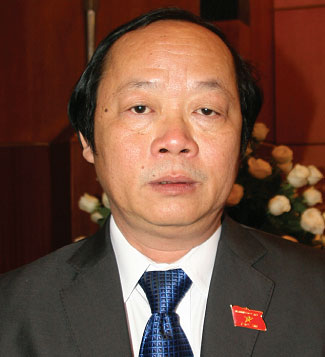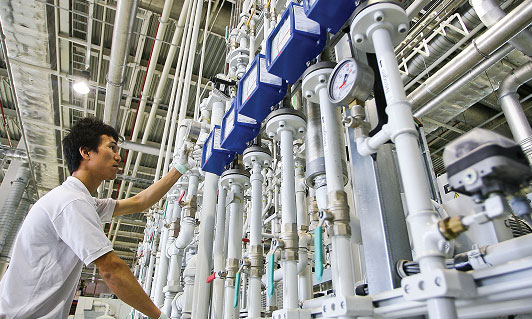Better legal system established to attract more high-technology projects
 How important is the application of advanced scientific and technological methods to Vietnam’s sustainability initiative and the socio-economic development plan for 2016-2020?
How important is the application of advanced scientific and technological methods to Vietnam’s sustainability initiative and the socio-economic development plan for 2016-2020?
I think the economy must always be developed with environmental protection in mind. The application of advanced scientific and technological solutions would not only be a driving force for economic development but also an optimal tool for environmental protection. We are shifting our economic development focus from quantity to quality, in which regard market and technology are becoming the economy’s two wings.
From a global viewpoint, any nation having advanced technologies is likely to be the winner in any market. The application of advanced scientific and technological solutions will be a pivot for Vietnam’s socio-economic development over the next five years. However, only when the government gives priority to advanced scientific and technological development and the attraction of hi-tech projects will it be able to ensure sustainable development.
The National Assembly recently adopted a series of laws related to scientific and technological development and their hi-tech application, such as the amended laws on investment and enterprise. Together with the above-mentioned pieces of legislation, has Vietnam attained a sufficient legal framework to attract hi-tech investors?
Yes, it has. These laws are offering tax incentives, land, credit and favourable customs procedures to investors and enterprises, and are also encouraging them to develop and apply high technology.
There has already existed a regulation promoting the establishment of enterprises’ own scientific and technological funds to facilitate their own development. Higher engagement in this area would help improve economic competitiveness.
The laws also comprise of provisions encouraging organisations and individuals to invest into scientific and technological development in Vietnam in the form of direct investment, joint venture or partnership. Particularly in 2014, the government promulgated regulations on investment and financial mechanisms for scientific and technological activities, including a stipulation that enterprises shall be required to establish their own scientific and technological funds and engage in research and development.
Specifically, state-owned enterprises set aside 3-10 per cent of their taxable income a year for establishing their own scientific and technological fund. Meanwhile, private-owned enterprises can also use a maximum of 10 per cent of their taxable income for this activity.

Vietnam is looking for more hi-tech investors to help achieve its modernisation goals
However, over the past years, Vietnam has failed to lure in a big number of hi-tech enterprises, while becoming a popular target for labour-intensive low-tech projects prone to causing environmental pollution. What are your views on this trend?
Over the past years, many localities in pursuit of high growth have been struggling to lure in as many investment projects as desired. Yet everything have to be changed. All investment projects are required to employ advanced technology, and hi-tech solutions are particularly encouraged. Localities also need to encourage and facilitate enterprises’ aspiration to this end. In the recent years, some hi-tech industrial and agricultural projects have been implemented, but their number remains small for now.
I think that over the next five years, we will be more selective about investment projects. Now is the time for us to focus on developing hi-tech areas.
However, while Vietnam currently has a sufficient legal framework for hi-tech development, many local and foreign investors have failed to receive incentives for their hi-tech projects. What do you think about this?
This is also true. In fact, the government has enacted good policies, but the implementation of the policies remains problematic. It would be necessary to set in place an initiative to remove this obstacle by further simplifying administrative procedures, extending the application of e-governance units and making the local investment climate more transparent and business-friendly. All other procedures must also be reformed, from tax payment through insurance packages to export-import procedures. Currently, these factors are hindering the country from luring in more investment, applying high technology and boosting socio-economic development.
The government has also enacted a list of hi-tech projects encouraging development in Vietnam, in the sectors of energy, electronics, informatics, and particularly in hi-tech agriculture.
At present, the government is attempting to boost the attraction of environmental friendly hi-tech projects. Nevertheless, a large number of already existing/implemented projects are continuously and rapidly damaging the environment. What should be done to address these projects?
Any polluter caught red handed will be punished, in accordance with the revised Law on Environment. Enterprises are legally obliged to comply with the environmental commitments they have made before implementing their projects. However, it is apparent that many enterprises have failed to invest into environmental protection and to mitigate the effects of their pollution.
Regarding establishments causing serious environmental pollution, if they fail to mitigate damage arising out of their actions, they will be relocated and obligated to invest into environmental protection. Upon failure to accept, the authorities will be entitled to revoke their business licences.
What do you think about Vietnam’s attraction of high technology over the past years?
Though the Law on High Technology was enacted in 2008, only a few instances of attracting high technology resulted, leaving pressure for further involvement on our part.
Currently, Vietnam is in a critical need of generating employment for a high number of manual labourers. Many provinces and cities are only interested in luring in labour-intensive projects with medium-level technology.
On the other hand, the government is trying to raise local labour productivity, which necessitates advanced technology. Vietnam will not be a place for investors to use cheap labour.
Do you think that localities have started focusing on attracting high technology, as it is currently the case for Hanoi, Bac Ninh, Vinh Phuc, Thai Nguyen, Danang and Ho Chi Minh City now?
Yes, many localities are concentrating on this. There is ample precedent when investment projects have been refused due to backward technology and environmental risk.
Vietnam’s development is now gradually directed to create a knowledge-based economy, with the application of advanced scientific and technological solutions as centrepiece. Awareness of the importance of these solutions among central-level and grassroot-level leaders has also improved strongly.
I do believe that the country has established a sufficiently welcoming scientific and technological legal system to attract more hi-tech projects during 2016-2020. Additionally, to this end, there will also be improvements in salaries, bonuses, and incentives for developing talents and encouraging enterprises and scientists to focus on hi-tech development.
What the stars mean:
★ Poor ★ ★ Promising ★★★ Good ★★★★ Very good ★★★★★ Exceptional
Latest News
More News
- Cement industry pleads for energy efficient tech (December 08, 2015 | 11:00)
- Going green to save a bundle (June 08, 2015 | 10:00)
- Green buildings: the rising trend (June 02, 2015 | 09:41)
- Green buildings – key to sustainable urban development in Vietnam (May 18, 2015 | 17:00)
- Feed-in tariffs continue to haunt green energy prospects (December 15, 2014 | 10:47)
- Building material types intrinsic to green ratings (December 09, 2014 | 11:56)
- Turning an eco- smart dream into reality (December 09, 2014 | 11:55)
- Green products enjoy a growing presence at Vietbuild Hanoi 2014 (December 01, 2014 | 10:06)
- Country profits from green building (November 24, 2014 | 11:02)
- Firms flout enviroment laws (November 17, 2014 | 10:48)















 Mobile Version
Mobile Version